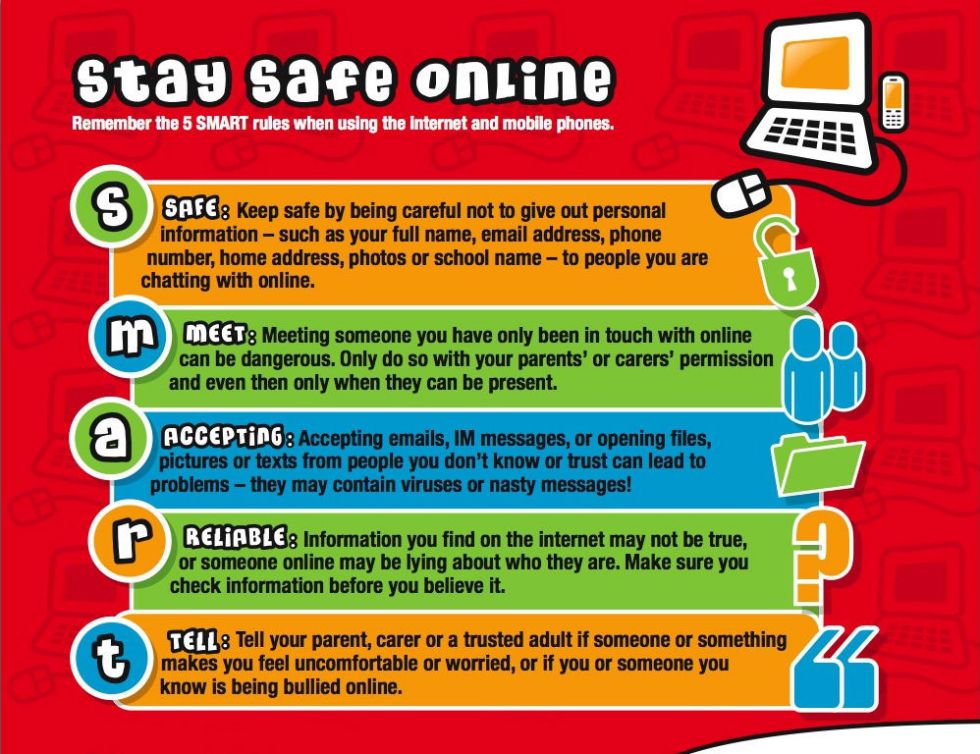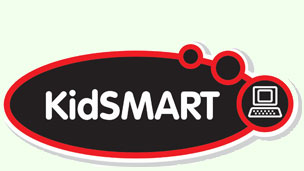When teaching IT to children one of the most important things to teach is the importance of keeping safe online. This includes:
- Not talking to anyone online you do not know, or anyone without an adults permission.
- Not giving out personal information i.e - your full name, address, street name, postcode, or school name, telephone numbers.
- If you receive any messages or pictures that worry or upset you talk to an adult you trust.
- Understanding why and what the age restrictions are for social media sites. The dangers of these sites, how people you do not know can contact you and obtain personal information about you by you using such sites.
- It’s a good idea to use a nickname rather than your real name.
- Do not fill out any forms without consulting an Adult.
- Do not webcam, send pictures or respond to anyone you do not know.
- The main focus of teaching E safety is to teach the students aware of how unsafe the internet is and how easily you can mistakenly publish information about yourself to the whole world, forever.
- Keeping Passwords secure by not sharing them with anyone
https://img2.blogblog.com/img/video_object.png
When discovering what E safety is, It is important to understand that it is a way of thinking when using any device; Laptop, Smart phone, Tablets etc. After being made aware of the possible dangers of not being E safe aware, the next main principle of E Safety is being constintly aware of what you are doing online and looking at some important questions.
These include:
If there is something that worries or scares me online do I know who to talk to?
By disussing these issues with Pupils, offering solutions and resources children are able to distinguish how to use the internet safely and securely.
whilst researching this topic I found The SMART rules on many of the schools websites and these are used for children to make and internet safety pledge.
Finally one of the most key pieces of information children learning about internet safety need to understand is that being honest and asking questions with adults is key to keeping you safe online. If for any reason, the child does not seem to have an attachment with an appropriate adult we need always give the relevant helplines and websites in order for the child to be kept safeguarded. There are also fact sheets for parents which I feel is a very good idea for parents who they themselves may be unaware of the potential dangers online.

http://www.bbc.co.uk/cbbc/topics/stay-safe
The CBBC Stay Safe site has lots of infomormation on how to keep safe.
Can you help the Horrible Histories gang stay safe online!


The SMART Crew
The SMART Adventure illustrates Childnet’s SMART rules and includes a real life SMART Crew of young people who guide the cartoon characters in their quest and help them make smart online decisions.
A lot of schools have online their slogans and posters for E safety, This is one I felt was good being hat it was short and easy to remember, with a fun catchy slogan.
Theyre are also fact sheets for parents which I feel is a very good idea for parents who they themselves may be unaware of the potential dangers online.
When discovering what E safety is, It is important to understand that it is a way of thinking when using any device; Laptop, Smart phone, Tablets etc. After being made aware of the possible dangers of not being E safe aware, the next main principle of E Safety is being constintly aware of what you are doing online and looking at some important questions.
These include:
- If I am on Social Media sites, What are the privacy settings on my own personal account and are they secure?
- Are my passwords easy for people to guess? do they include upper case, lower case and numbers to ensure optimum security?
If there is something that worries or scares me online do I know who to talk to?
By disussing these issues with Pupils, offering solutions and resources children are able to distinguish how to use the internet safely and securely.
whilst researching this topic I found The SMART rules on many of the schools websites and these are used for children to make and internet safety pledge.
Finally one of the most key pieces of information children learning about internet safety need to understand is that being honest and asking questions with adults is key to keeping you safe online. If for any reason, the child does not seem to have an attachment with an appropriate adult we need always give the relevant helplines and websites in order for the child to be kept safeguarded. There are also fact sheets for parents which I feel is a very good idea for parents who they themselves may be unaware of the potential dangers online.
Please find below links to websites that help children keep safe and help you with internet safety awareness to help your children.
"The internet is always changing, and being able to keep up to date with your children's use of technology can be a challenge, especially if you feel that your children may have better technical skills than you do. However, children and young people still need support and guidance when it comes to managing their lives online and using the internet positively and safely."
E-Safety for Children
Here are a sample of websites used to get information and help teach children about E safety

http://www.bbc.co.uk/cbbc/topics/stay-safe
The CBBC Stay Safe site has lots of infomormation on how to keep safe.
Can you help the Horrible Histories gang stay safe online!
Quiz: Can you keep Dodge safe online?
http://www.bbc.co.uk/cbbc/games/keep-dodge-safe-online
http://www.bbc.co.uk/cbbc/games/keep-dodge-safe-online

http://www.childnet.com/young-people/
Welcome to the children's activity zone! The internet is a wonderful place to explore and discover new things, to connect and communicate with others and to be creative.
Welcome to the children's activity zone! The internet is a wonderful place to explore and discover new things, to connect and communicate with others and to be creative.

The SMART Crew
The SMART Adventure illustrates Childnet’s SMART rules and includes a real life SMART Crew of young people who guide the cartoon characters in their quest and help them make smart online decisions.




